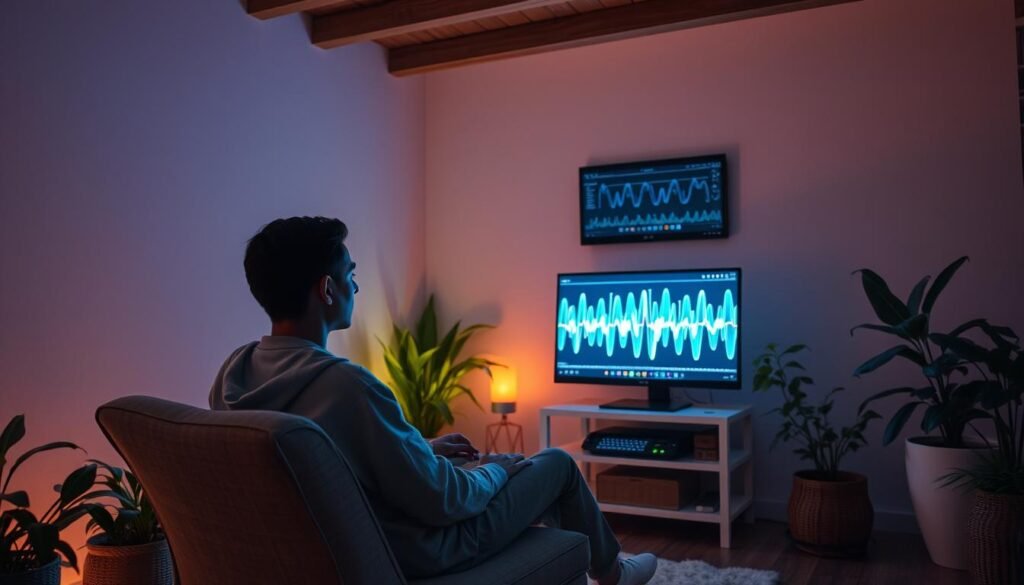Did you know cognitive-behavioral therapy (CBT) is highly effective for many mental health issues, including anxiety? This fact highlights the strong link between our mental health and brain function. Anxiety can affect different parts of our lives, leading to significant distress.
As we go through this article, we’ll explore effective anxiety treatments aimed at brain health. We’ll look into medication options and psychological methods. You’ll learn about various anxiety management strategies and brain-focused therapies. Our goal is to help you with practical advice for handling anxiety.
Key Takeaways
- CBT has proven effective for various anxiety disorders.
- Understanding the relationship between brain health and anxiety can lead to better treatment outcomes.
- There are multiple evidence-based approaches to managing anxiety.
- Pharmacological and psychological treatments play essential roles in anxiety relief.
- Holistic methods, including mindfulness and nutrition, can enhance traditional therapies.
- Combining therapies can improve the effectiveness of anxiety treatments.
Understanding Anxiety and Its Impact on Brain Health
Anxiety disorders are a major health issue worldwide. They bring about considerable psychological, social, and economic costs. This condition touches millions, with studies showing that many people face phobias and social anxiety. For example, up to 15% may experience specific phobias, and about 7.4% suffer from social anxiety disorder annually.
To truly understand anxiety, we must see its effects on our minds and emotions. It can upset the balance of important brain chemicals. This may cause trouble focusing, a tendency to dwell on the negative, and less productivity at work and in social settings.
Anxiety is not just about one brain region; it involves a complex network. Recent studies reveal that multiple areas of the brain work together in anxiety. The dorsal anterior cingulate cortex boosts fearful feelings. At the same time, the ventromedial prefrontal cortex tries to lower them. If the latter is damaged, anxiety levels can rise, showing the deep link between brain health and anxiety disorders.
Studies on anxiety uncover its effects on mental state. Both acute and chronic anxiety can make us overly worried about future troubles. While this might enhance our ability to spot dangers, it also leads to distraction and mental decline.
The ongoing research into anxiety points to a critical need for effective treatments. Since anxiety often goes hand in hand with depression, tackling these problems together is key. Doing so is vital for better mental health outcomes.
Neuroscience Behind Anxiety Disorders
Research into anxiety allows us to understand its biological roots. It shows us how the amygdala and the prefrontal cortex are vital. They help manage our emotional responses. The connection between these brain areas shows why people feel more anxious when there’s a problem.
Chemicals like serotonin, norepinephrine, and dopamine are crucial for controlling our mood and anxiety. Changes in these chemicals can lead to anxiety disorders. Genetics also influence these changes, making some people more likely to develop anxiety. Additionally, certain neuropeptides play a key role in how we manage stress.
The hypothalamic-pituitary-adrenal (HPA) axis links several brain areas to stress responses. It’s especially active under stress, influenced by various hormones. This system’s role is key in understanding the onset of anxiety disorders and their lifelong impact. Anxiety often comes hand in hand with other issues like depression, making it harder to treat.
Another critical area is the hippocampus, which controls emotional reactions and anxiety. When faced with threats, increased activity here can lead to anxiety. Changes in how the hippocampus works can cause issues like epilepsy and chronic anxiety. Problems with learning to not fear also affect how well treatments work.
Treatments Targeting Brain Function in Anxiety
Exploring treatments for anxiety means looking at how neurotransmitters and neuroplasticity work. Neurotransmitters help control our mood and anxiety. If they are out of balance, we might feel stressed or anxious. GABA, a key neurotransmitter, helps lessen stress and improve sleep by working with glutamate. Together, they act like a switch for brain function, turning stress responses on or off.
Role of Neurotransmitters in Anxiety Management
Our feelings are closely linked to neurotransmitters like serotonin, dopamine, and GABA. Medicines such as diazepam (Valium) and alprazolam (Xanax) try to balance these chemicals in our brains. Foods like kimchi and tempeh also help by providing GABA. This tells us that a better understanding of neurotransmitters can lead to effective anxiety treatments.
Neuroplasticity and Its Effects on Anxiety Treatment
Neuroplasticity is a key area in anxiety research. It shows how the brain can change and adapt, opening new ways to treat anxiety. Techniques that promote neuroplasticity, like some cognitive therapies, help people change their thought patterns and reduce anxiety. Such methods prove that adapting our brain’s wiring can deeply affect how we manage anxiety. Cognitive Behavioral Therapy is an example of a treatment that uses this approach successfully.
| Neurotransmitter | Function | Associated Conditions | Common Treatments |
|---|---|---|---|
| GABA | Inhibitory, reduces anxiety and stress | Anxiety disorders, insomnia | Valium, Xanax, dietary supplements |
| Serotonin | Regulates mood, promotes happiness | Depression, anxiety | SSRIs, SNRIs |
| Dopamine | Rewards and pleasure, motivation | Depression, addictive behaviors | Antidepressants, counseling |
Pharmacological Treatments for Anxiety Disorders
About 32% of people in the United States have anxiety disorders. This makes finding the right treatment very important. There are many kinds of medicine that help manage anxiety and make life better. These medicines are a big help in reducing the symptoms of anxiety.
Antidepressants and Their Role in Anxiety Relief
SSRIs and SNRIs are top choices for treating anxiety now. They are used for Generalized Anxiety Disorder, Panic Disorder, and Social Anxiety Disorder. Studies show these medicines are more effective than a placebo. Escitalopram and duloxetine, for instance, are highly preferred by doctors due to their strong impact.
However, not everyone gets better with these medicines. Some reasons include the wrong dose or that the medicine doesn’t work for them. Side effects like sexual issues can also be a problem for many on SSRIs.
Finding the right treatment can be hard. About 20% of patients might need 10-12 weeks or more to see improvement. Because of these challenges, combining medicine with therapy is key. Knowing how severe the anxiety is at the start can help doctors choose the best medicine. Learning more about the science of anxiety disorders also improves treatment choices.
Buspirone and Other Anti-Anxiety Medications
Buspirone is another option for treating anxiety. It works on serotonin receptors but doesn’t have some SSRIs’ side effects. This makes it a good choice for those who can’t handle other medicines. There are also benzodiazepines, which work fast but aren’t good for long-term use because they can be addictive.
Blending medicines with therapy can lead to better results. Studies show that while medicine helps with symptoms, adding therapy can boost recovery. It’s important to use both medical and therapy approaches for the best care in anxiety treatment.

| Medication Class | Example Medications | Efficacy | Common Side Effects |
|---|---|---|---|
| SSRIs | Escitalopram, Sertraline | Higher efficacy than placebo | Nausea, insomnia, sexual dysfunction |
| SNRIs | Duloxetine, Venlafaxine | More effective for certain patients | Headache, dizziness, fatigue |
| Buspirone | Buspirone | Effective for anxiety relief | Dizziness, nausea, headache |
| Benzodiazepines | Alprazolam, Lorazepam | Rapid relief of anxiety symptoms | Dependency risk, sedation |
Psychological Interventions for Brain Function and Anxiety
Psychological methods are key for better brain function and tackling anxiety. Cognitive behavioral therapy (CBT) is a leading choice. It helps people change bad thought patterns. By teaching ways to cope, CBT builds strength against anxiety.
Cognitive Behavioral Therapy (CBT)
CBT focuses on the thoughts that fuel anxiety. It helps identify what triggers worry and fights negative thinking. Studies show CBT cuts down anxiety symptoms and boosts happiness. It even lowers activity in the amygdala, a stress-related brain area. For more tips on handling anxiety, check out this link.
Exposure Therapy Techniques
Exposure therapy eases people into feared situations slowly, which helps stop avoidance. It’s a part of CBT and improves dealing with anxiety over time. Patients face their fears safely, gaining confidence and emotional control. Including exposure therapy offers a well-rounded way to manage anxiety.
Neurofeedback for Anxiety Relief
Neurofeedback is a new way to handle anxiety. It uses live data to help people control their brain functions. This method connects different brain areas. It especially looks at how the prefrontal cortex and the amygdala work together. Studies show this type of brain training can really help.
Chronic anxiety can make other health problems worse, like IBS. It can also raise the risk of heart problems. Neurofeedback can be another option for treating anxiety. It works on the brain’s electrical patterns that change in anxious people. EEGs show a special activity in the right side of the frontal cortex in anxious people.
Studies have found neurofeedback to be effective in treating ADHD and depression too. A study showed neurofeedback improved brain connections important for controlling emotions. This helped people feel less anxious for a long time. This way of treating anxiety can help quickly and have long-term benefits.
Neurofeedback lets people actively improve their emotional health. Training the brain in this way has shown good results. It often reduces anxiety and makes life better. With anxiety affecting 20-30% of people, new and gentle treatments are important. For those looking for new solutions, checking out neurofeedback for anxiety relief could help manage their mental health.

Holistic Approaches to Anxiety Treatment
In recent years, holistic approaches to treating anxiety have become more popular. These methods focus on the whole well-being of a person. Integrating certain lifestyle practices can help manage anxiety symptoms. Mindfulness and a balanced diet play key parts in improving mental health.
Mindfulness and Meditation Practices
Mindfulness and meditation are now widely seen as helpful for anxiety. These methods teach people to be aware of the present moment. They learn to accept their thoughts and feelings without criticism. Doing mindfulness exercises like deep breathing can lower stress.
Studies show regular meditation can help people control their emotions better. This resilience is crucial when dealing with anxiety. Adding these practices to daily life can have a soothing effect, easing anxiety symptoms over time.
Nutritional Impact on Anxiety Management
Nutrition is key in managing anxiety. Eating a balanced diet supports brain health and affects anxiety. Experts suggest eating whole foods such as fruits, veggies, lean proteins, and healthy fats. Foods rich in omega-3 fats, like fatty fish, are great for mood stabilization.
Avoiding processed foods and too much sugar is also beneficial. Good nutrition is not just about physical health. It’s a major part of treating anxiety holistically.
Evidence-Based Therapies for Anxiety
Anxiety disorders are very common, affecting many people around the world. The need for effective treatments is growing. This highlights the role of evidence-based therapies. These approaches offer proven ways to handle anxiety symptoms. They blend medication and psychological strategies for a fuller approach to managing anxiety.
Importance of Combining Therapies for Optimal Results
Using multiple therapies together can improve chances of overcoming anxiety. Cognitive-behavioral therapy (CBT) is a top choice. It usually involves weekly sessions across 3 to 4 months. Within CBT, exposure therapy lets patients face their fears gradually, helping ease anxiety over time.
Tailoring treatments to each person has shown good outcomes. For instance, those with Generalized Anxiety Disorder (GAD) might find cognitive exercises and mindfulness helpful along with other treatments. Studies show that CBT can greatly better a person’s life and health, standing as a key tool against anxiety.
In CBT, therapists and clients work together to tackle immediate issues and actions. This method builds self-help skills through practice and homework outside of sessions. Combining various treatments can boost recovery and lessen chances of the anxiety coming back.

| Therapy Type | Description | Efficacy |
|---|---|---|
| Cognitive Behavioral Therapy (CBT) | Focused on changing negative thought patterns and behaviors. | Highly effective for various anxiety disorders, including GAD, SAD, and panic disorder. |
| Exposure Therapy | Gradual exposure to anxiety-inducing situations. | Reduces fear responses over time, particularly beneficial in phobia treatment. |
| Pharmacological Interventions | Use of SSRIs and SNRIs to manage symptoms. | First-line treatment for anxiety, particularly for GAD and SAD. |
| Mindfulness Techniques | Incorporating mindfulness into therapeutic practices. | Enhances emotional regulation and reduces anxiety. |
Mixed treatment approaches emphasize the importance of personalized care. They also show the lasting impact of evidence-based therapies for anxiety on mental health.
Anxiety Management Strategies for Lifestyle Changes
Adopting lifestyle changes can greatly enhance your well-being. It’s important to know how physical activity and good sleep can lower your anxiety. These are practical ways for anyone looking to ease their stress.
Physical Activity and Its Benefits
Regular physical activity plays a key role in handling anxiety. Both yoga and tai chi are popular choices. In 2023, about 33 million Americans chose yoga, and nearly 4 million went for tai chi. These exercises are great for letting go of stress. They make you feel better and less anxious.
A study with 185 university students found a notable reduction in stress with aerobic exercise. Just working out two days a week made a big difference. It shows how important exercise is for managing stress.
- Enhances mood through the release of endorphins.
- Improves sleep quality, counteracting factors associated with anxiety.
- Provides a healthy outlet for stress, reducing reliance on unhealthy coping mechanisms.
To manage anxiety better, find physical activities you enjoy. This makes it easier to stick with them and really benefit from the exercise.
Sleep Hygiene’s Role in Reducing Anxiety Symptoms
Good sleep hygiene is crucial for easing anxiety. Sadly, one in three Americans struggle with sleep. They say their sleep quality is “poor” or “only fair.” This shows we need to pay more attention to our sleep habits.
Setting up a sleep routine can greatly improve your mental health. Consistent bedtimes and a calm environment make a big difference. Cutting back on screen time before bed also helps a lot.
| Sleep Hygiene Practices | Effects on Anxiety |
|---|---|
| Consistent sleep schedule | Regulates body clock, promotes deeper sleep |
| Creating a restful environment | Minimizes distractions, enhances relaxation |
| Limiting caffeine and alcohol intake | Reduces sleep disruptions, lessens anxiety triggers |
Embracing these sleep habits is crucial for anyone looking to reduce anxiety. For more tips, you can check out these resources. They highlight how vital these changes are for your mental health.
Conclusion
The journey in managing anxiety shows how our brain works with anxiety. Studies have shown combining drug treatments, therapy, and brain stimulation works best. Especially, people felt less anxious when they got real stimulation versus a fake one. This shows treating the brain is key in fighting anxiety.
Anxiety often comes with depression, which makes finding the right treatment crucial. Using treatments like Transcranial Magnetic Stimulation (TMS) helps with anxiety and depression. With more than 28% of people facing anxiety in their lifetime, finding good treatments is important for living better lives.
This summary of anxiety treatment shows improving brain health is crucial in dealing with anxiety disorders. By using different treatments together, people can see major improvements in their anxiety. This approach could greatly improve life for those struggling with anxiety.